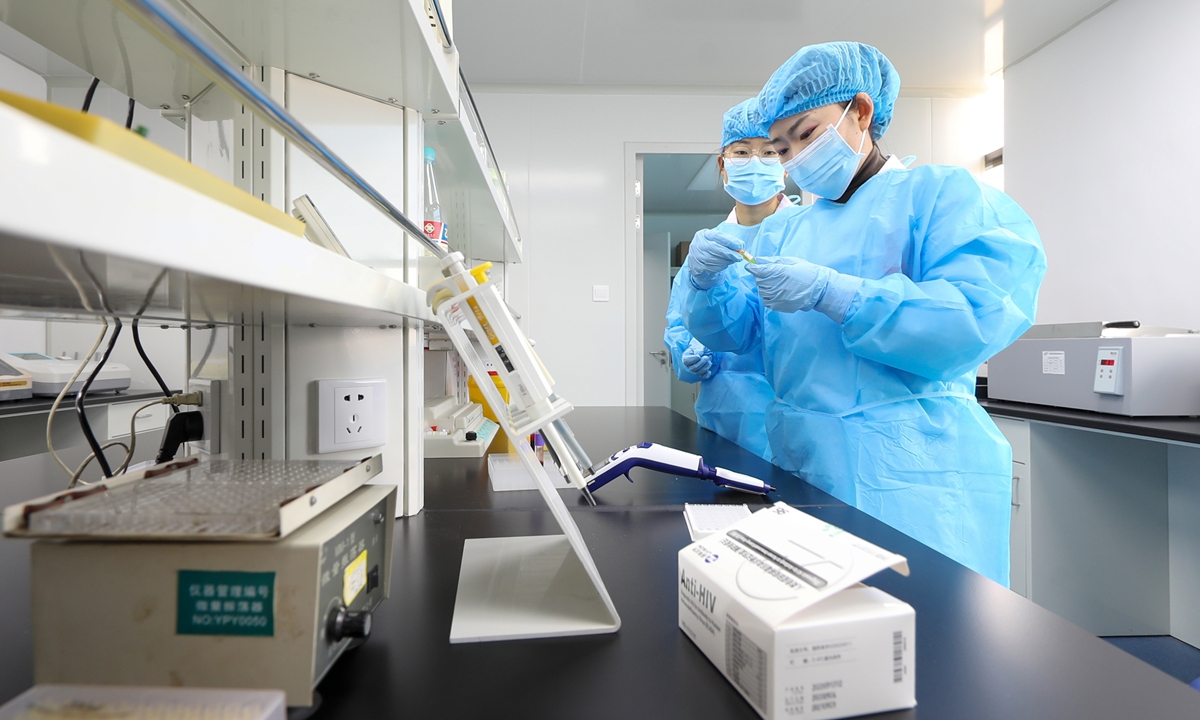
 i_need_contribute
i_need_contribute

A doctor tests the blood sample of an AIDS patient at a county-level disease control center in Tongren, on December 1, 2021. Photo: VCG
HIV can lead to acquired immunodeficiency syndrome (AIDS), a chronic and fatal disease with a natural course of about eight to 10 years. Some scholars liken the course of AIDS to "a train approaching a cliff," with the end stage of AIDS or death being the "cliff," the viral load of AIDS representing the "speed of the train," and the count of CD4+ T cells - or helper T cells that help coordinate the immune response against infection and disease - representing the "distance to the cliff."
Currently, Highly Affective Antiretroviral Therapy (HAART) can be used to greatly improve the prognosis for HIV-infected individuals. However, 20 to 30 percent of AIDS patients still cannot achieve sufficient CD4+ T cell recovery, despite long-term virological suppression, leading to immune reconstitution failure or immune non-response, increasing the risk of infections, malignancies, and non-AIDS-defining events.
In an exclusive interview with the Global Times, Li, director of the AIDS treatment center of Peking Union Medical College Hospital, said that the mechanism of immune reconstitution failure in AIDS patients is not fully understood, but it might be related to factors such as reduced lymphocyte production, inadequate thymus generation, and cytokine imbalance, or possibly related to continuous immune activation leading to CD4+ T cell aging.
Some treatment strategies have been developed, but these therapies have not been proven effective, and immune reconstitution failure is still considered a key problem that threatens the lives and health of many AIDS patients, according to Li.
Therefore, the team led by Li tried to use a kind of TCM called Tripterygium wilfordii Hook F (TwHF, or Leigongteng in Chinese) to treat AIDS. According to Li, TwHF is an immunomodulator and it has been used in the treatment of autoimmune diseases.
At the CROI 2024, Liu Xiaosheng from Li's team reported a research result that involved using simian immunodeficiency virus (SIV)-infected rhesus monkeys to simulate HIV-infected individuals, to observe the immunomodulatory mechanism of LLDT-8, a novel compound modified from the main bioactive component triptolide whose full name is (5R)-5-hydroxytriptolide, or Leitengshu in Chinese, in animal models and human cell experiments.
The research results showed that LLDT-8 significantly alleviated the proportion of activated CD8+ T cells in SIV-infected rhesus monkeys. Also known as "killer T cells," CD8+ T cells are cytotoxic, which means that they are able to directly kill virus-infected cells, as well as cancer cells.
According to Liu, Li's team has built a relatively complete evidence chain from preclinical to clinical, from in vitro to animal, to the human body, for LLDT-8.
"We hope that further studies with expanded samples and more detailed mechanistic research will provide better strategies for immune reconstitution failure in HIV-infected individuals," Li said.